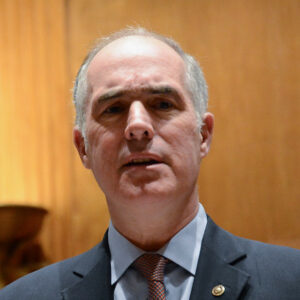(This article first appeared in Broad + Liberty.)
In May, Sen. Bob Casey celebrated $200,000 in grant funding to a health and human services nonprofit near Scranton — one that has used Casey’s brother-in-law as a state-based lobbyist.
While there’s no evidence that the relationships involved an improper quid pro quo, it’s yet another example of Casey’s family relationships intersecting with his regular business as a senator. It’s the kind of intersection that could be viewed as even the appearance of a conflict of interest, an appearance which most elected officials studiously strive to avoid.
The May celebration wasn’t Casey’s only interaction with the nonprofit, Maternal & Family Health Services.
In May 2022, Casey held a roundtable with MFHS to discuss the infant formula shortage that was causing concern at the time..
Pennsylvania lobbying records show Casey’s brother-in-law, Patrick Brier, signed on as a lobbyist for MFHS just six months before, in December of 2021.
Requests for comment to Casey’s Senate office, Brier, and a representative for Brier were not returned.
Brier’s registration is only to lobby at the state level, meaning he is not registered to lobby on federal issues.
Similar issues have arisen before with Brier.
Broad + Liberty reported in August that Brier works as a lobbyist for Keystone First, a Pennsylvania-based Medicaid managed-care company. He started work for that company just months before a federal audit was set to be released in 2021 — an audit begun after Casey called for an investigation into managed-care companies two years earlier in 2019.
With that story, a representative for Brier defended him, and the connection to Casey.
“Mr. Brier is not now and never has been engaged as a federal lobbyist on behalf of Keystone First,” said Scott Caulfield, a Harrisburg attorney.
“In fact, Mr. Brier does not engage in any federal lobbying work whatsoever. Mr. Brier does not receive any compensation from, or have any financial interest(s) relating to, any firm or other person that lobbies any member of the United States Congress, for any purpose,” Caulfield concluded.
Caulfield’s answer was not false, but he also did not try to deny that Brier was still in fact a registered lobbyist for a company being audited by a federal agency.
In 2002, the Wilkes Barre Times-Leader reported on another potential conflict of interest between Brier and Casey.
In this instance, Brier had worked for a law firm that helped a Luzerne County-based nursing home negotiate a settlement with the federal government after it was discovered that it had overcharged Medicare by $2 million.
Casey, not yet a senator and then running for governor, had been running ads at the time boasting about how he had cracked down on nursing home billing fraud while serving as Pennsylvania’s auditor general.
The combination of circumstances caused some in the area to wonder why Casey hadn’t discovered the overbillings at the nursing home in question. And one local leader at the time “questioned whether the Democratic commissioners decided to hire a firm [Brier’s, for the settlement negotiations] with ties to Casey as a safeguard against a state audit,” the Times-Leader reported.
Other familial connections for Casey have popped up recently, outside of Brier.
In February, Politico reported that Casey’s brother, Patrick, had just recently filed to lobby at the federal level “on issues ranging from implementation of the CHIPS and Science Act to online travel policies last year, disclosures show.”
“While there is no statutory restriction governing contact between a member of Congress and an immediate family member who is a lobbyist, Senate ethics rules require that a lawmaker whose spouse or immediate family member is a lobbyist bars their staff from having any ‘lobbying’ contact with that person,” according to Politico.
The New York Post reported in August that “Sen. Bob Casey’s political campaign has taken hundreds of thousands of dollars from his brother’s personal injury law firm over the past 15 years — and the lawmaker has tapped one of its partners to help him nominate federal judges.”
Casey’s other brother, Matt, works for that personal injury law firm.
Finally, Breitbart reported that Casey was months late in reporting on a 2018 stock sale by one of his children, a transaction that is required to be reported per Senate ethics rules.
Casey has never given an explanation for why the report of the stock sale was late, and ignored questions from Broad + Liberty in follow-up to the Breitbart report.

